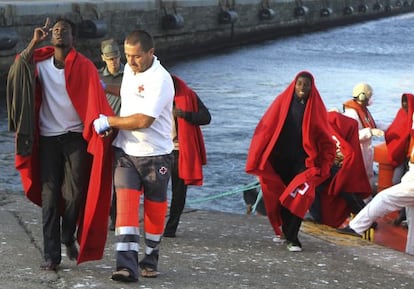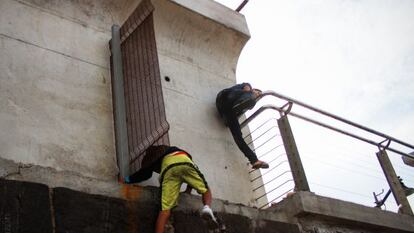Closer cooperation with Morocco brings results
Spain also working with Senegal and Mauritania in an attempt to stem flow of migrants

"Spain has done many positive things for Morocco," said French Foreign Minister Laurent Fabius last week, commenting in the light of the deaths of hundreds of migrants trying to make the crossing from Tunisia to the Italian island of Lampedusa. It is now 25 years since the discovery of a drowned migrant on a beach in Cádiz. Since then, clandestine immigration into Spain via the Strait of Gibraltar has continued, resulting in the deaths of thousands of people, according to estimates by NGOs and other organizations.
Until the drowning of 37 migrants in October 2003, the Moroccan authorities had not cooperated with their Spanish counterparts, and Rabat had even been accused of doing nothing to prevent hundreds of migrants leaving during the summer period. Since then the routes across the Strait of Gibraltar have largely been shut down, although would-be migrants also try to cross over to the Canary Islands from Mauritania and Senegal, on the northwest coast of Africa, as well as through Ceuta and Melilla. Preventing entry to Spanish territory via the latter two cities has proved particularly difficult.
Francisco Martínez, secretary of state for security, told deputies in Congress last Tuesday that Spain's relationship with Morocco is "exemplary, magnificent," in dealing with clandestine migration. There is also reportedly close cooperation with Mauritania and Senegal.
There was a 90 percent drop off in illegal migration into Spain between 2006 and 2012, with an almost total end to entry into the Canary Islands by would-be migrants, says Martínez, noting that the trend has continued throughout this year. Spain's main advantage over Italy as regards illegal immigration is that the countries they are coming from, Morocco and Mauritania, are able to control their borders, whereas Libya, which is just 176 kilometers from Lampedusa, off the coast of Sicily, is run by myriad militias and armed groups unable or unwilling to patrol its frontiers with sub-Saharan Africa.
Although the numbers of would-be migrants trying to make their way into Spain from Morocco has fallen sharply, there are still periods when large numbers suddenly try to make their way across the Strait of Gibraltar. In August, after the end of Ramadan, a large number of people tried to make the crossing using small, inflatable boats that were not seaworthy. Around 1,000 people have been rescued from such vessels, says Martínez (last week a rickety boat with 18 people aboard was picked up some 50 nautical miles off the coast of Cartagena, in Murcia).
Illegal migration into Spain fell by 90 percent between 2006 and 2012
In the fight against clandestine immigration, the Spanish authorities are now turning their attention to Ceuta and Melilla. Despite cooperation with Rabat and having doubled the height of the fences around the two cities, this year has seen repeated concerted attempts by migrants either by sea, or by hundreds of people effectively storming the fences, prompting fears that the Moroccan authorities would reintroduce the use of military patrols with permission to open fire on those trying to cross, as it did in 2005. One person was killed by Moroccan troops; since then 14 have died trying to enter the two cities. Many of these stories are largely ignored by the media.
The Interior Ministry intends to spend 2.5 million euros on strengthening the fences around Ceuta and Melilla, posting closed circuit cameras, as well as placing a metal covering over the six-meter high barrier in the latte. It adds that it will spend a further 1.8 million euros on extending the SIVE electronic surveillance program that monitors all activity in the Strait of Gibraltar. The system has cost 237 million euros since it was created in 2000.
Ombudsman's office takes up issue of minors with PP

They live in the sea walls around the port of Melilla. Most are minors, some as young as 10, although the majority are aged between 15 and 17 and are mainly Moroccans, although there are some Algerians and Syrians. Their goal is to hide underneath a truck heading for mainland Spain, or to find some other way to board the ferries crossing the Strait of Gibraltar.
At night they drop an eight-meter rope down from the walls of the port, making their way through the parking areas to the trucks waiting to board the ferries. José Palazón of local NGO Prodein, which works with minors, says that around four or five are successful.
The rest will be caught by security staff and handed over to the police, who in turn return them to their makeshift refuges among the seawalls, dirty, hungry and tired. The majority of these adolescents are under the care of the authorities in Melilla, and have escaped from La Purísima Catholic Church-run children's home. A few will have arrived directly from Morocco, via the border. "Until the middle of October, the city was overrun with minors," says José Guerrerro of the local police.
Palazón says that the children escape from La Purísima for two reason: "Anybody under the state's care who arrives there after 11pm loses the right to that care and has to reapply from scratch," he says, adding: "But more importantly, once they turn 18, they are no longer in the care of the authorities, so there is no point staying there. That is why they try to get to mainland Spain, where they can retain their resident status even after they are over 18 years of age."
The Spanish Ombudsman has taken up the issue of the minors, and has written several times over the last five years to the Popular Party (PP) authorities in Melilla, arguing that the removal of the duty to care is not applicable just because minors voluntarily abandon La Purísima.
The Ombudsman has also protested the withdrawal of residency rights when minors turn 18, pointing out: "These young people are forced to live in the street, even though Spanish law regarding foreigners means they have the right to extend their authorization to live here." The Ombudsman's office has since passed on its concerns to the State Attorney's Office.
EL PAÍS made several attempts to speak to María Antonia Garbín, PP social welfare and health councilor in Melilla, to ask about the unaided minors, but received no response. Her department is responsible for the La Purísima center.
Tu suscripción se está usando en otro dispositivo
¿Quieres añadir otro usuario a tu suscripción?
Si continúas leyendo en este dispositivo, no se podrá leer en el otro.
FlechaTu suscripción se está usando en otro dispositivo y solo puedes acceder a EL PAÍS desde un dispositivo a la vez.
Si quieres compartir tu cuenta, cambia tu suscripción a la modalidad Premium, así podrás añadir otro usuario. Cada uno accederá con su propia cuenta de email, lo que os permitirá personalizar vuestra experiencia en EL PAÍS.
¿Tienes una suscripción de empresa? Accede aquí para contratar más cuentas.
En el caso de no saber quién está usando tu cuenta, te recomendamos cambiar tu contraseña aquí.
Si decides continuar compartiendo tu cuenta, este mensaje se mostrará en tu dispositivo y en el de la otra persona que está usando tu cuenta de forma indefinida, afectando a tu experiencia de lectura. Puedes consultar aquí los términos y condiciones de la suscripción digital.








































